What are the best sweeteners for the keto diet? Check out this comprehensive guide to baking with sugar substitutes, and learn how to get the taste and texture you crave!
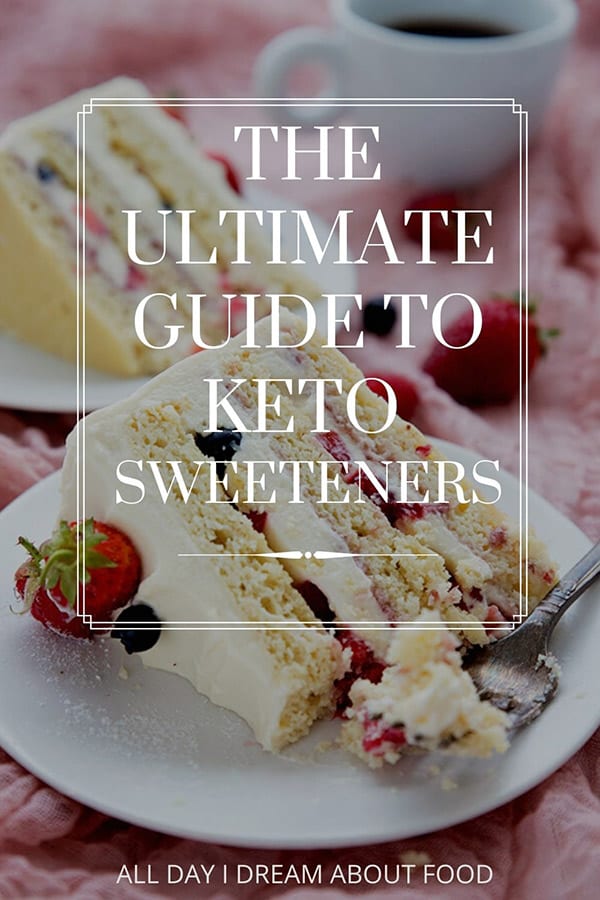
Today, my keto friends, I am imparting some of my vital knowledge and deep wisdom about using keto sweeteners. We will discuss all of their pros and cons, and how they affect the outcome of your keto desserts.
In advance of the holiday baking season, I figured you could put this information to good use. Because if you’re anything like me, you like to get an early jump on your keto holiday cookies!
This is actually an abridged version of the in-depth keto sweetener section in my book, The Ultimate Guide to Keto Baking. I think you will find it very informative.

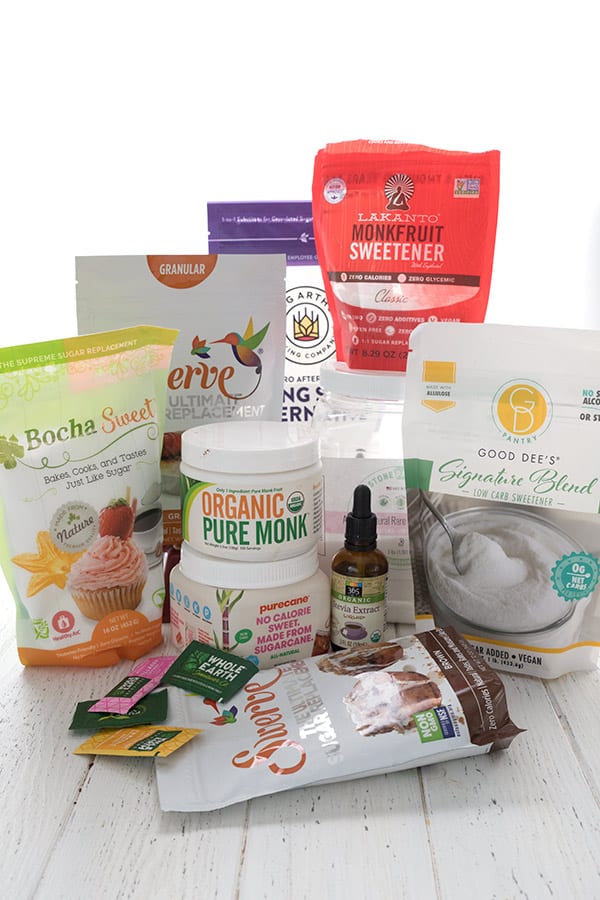
What is the best keto sweetener?
I’m sorry, I simply cannot answer that for you.
I’m not being willful or stubborn, or deliberately withholding information. It’s simply that there is no such thing. Yes, you read that right – there is no such thing as the best keto sweetener.
Here’s why: Everyone experiences these sugar substitutes differently. It’s almost as individual as the individual themselves.
- Some people experience an unpleasant aftertaste with one and not another.
- Some people suffer from GI issues or headaches when consuming certain sweeteners.
- Some people see a blood sugar rise when other people do not.
- Some people may even experience an allergic reaction to certain sweeteners.
With the sugar substitutes market constantly expanding and changing, it’s much more about finding what sweeteners work best FOR YOU.
What are the best sweeteners for keto baking?
Ah, now we’re on to something. This is my territory and one that I have researched extensively. I have experimented with a wide array of sugar substitutes and I can tell you straight up that none of them behaves exactly like sugar.
They all have very different properties and the sweetener(s) you choose will impact the outcome of your recipes. The trick is to understand their different attributes and use them to advantage.
Consider the final product before choosing your sugar substitutes. What are you trying to make? What consistency are you trying to achieve? Do you want it crisp or soft? Chewy or cakey? Should it be gooey or firm?
Most of the popular brands on the market are actually blends of two or more keto sweeteners. For simplicity’s sake, I am going to break them down into their main ingredients.
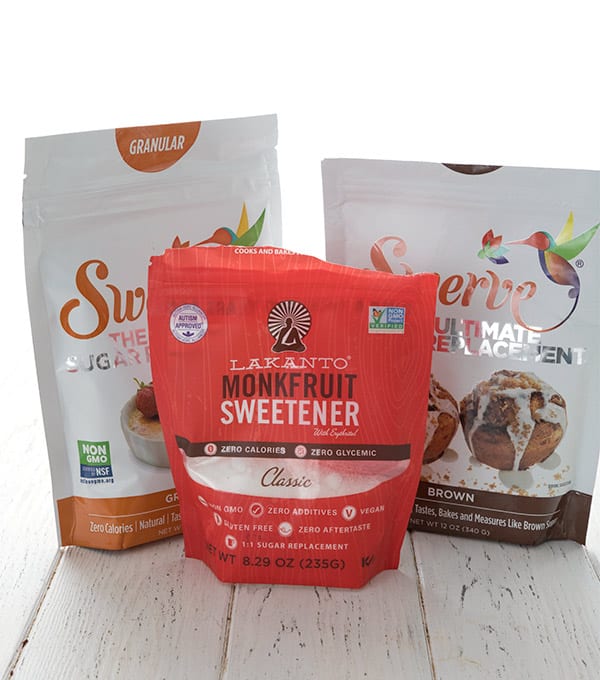
Erythritol
What is it?
Erythritol is a sugar alcohol (polyol) that is naturally present in some fruits and fermented foods. For mass production, it is made by fermenting a glucose syrup with enzymes.
It is unique among sugar alcohols in that it has zero carb impact. Our bodies simply do not recognize it as a carb so it does not impact blood sugar at all. And unlike many sugar alcohols, it does not cause gastrointestinal issues for most people.
How does it work?
Similar to sugar:
– Erythritol mimics sugar in its crystalline structure, so it helps whip air into butter and egg whites.
– It also browns and crisps up nicely and it can even be coaxed into caramelizing.
Differs from sugar:
– It’s only 70% as sweet as sugar, which is why most brands combine it with other sweeteners, to make it measure cup for cup.
– It’s non-hygroscopic, meaning that unlike sugar, it does not attract or hold onto moisture, which can cause baked goods to be dry and crumbly if they don’t have enough fat.
– It can re-crystallize as it cools, particularly in liquid applications like sauces, custards, and ice cream.
– Some people experience a mouth-cooling sensation, similar to sucking on a mint. Not everyone experiences this, and often mixing it with other sweeteners eliminates this sensation.
Major Brand Names: Swerve, Lakanto (this is mostly erythritol… do not be fooled by the fact that it calls itself a “monk fruit sweetener”), So Nourished, ZSweet.

Xylitol
What is it?
Xylitol is also a sugar alcohol found in some fruits and vegetables, as well as in wood and corn. It is usually manufactured commercially from corn or birch trees.
Some, but not all, xylitol is absorbed by the intestines into the bloodstream. This means it can cause some gastrointestinal discomfort when consumed in large amounts. It can also have an impact on blood sugar.
WARNING! The biggest issue with xylitol is that it is highly toxic to dogs.
How does it work?
Similar to sugar:
– It has a crystalline structure so it can whip air bubbles into butter and egg whites. It’s also as sweet as sugar.
– It’s more hygroscopic than erythritol so it attracts moisture and it doesn’t re-crystallize as it cools. Xylitol is great for ice creams and sauces to keep them soft.
Differs from sugar:
– Xylitol doesn’t caramelize or crisp up very well. This can cause problems for baked goods that need a crisp texture, like many keto cookies. They will turn out much more cakey and soft if you use xylitol.
– Definitely do NOT use for meringue, as it will stay gooey and soft, and won’t come off the parchment paper.
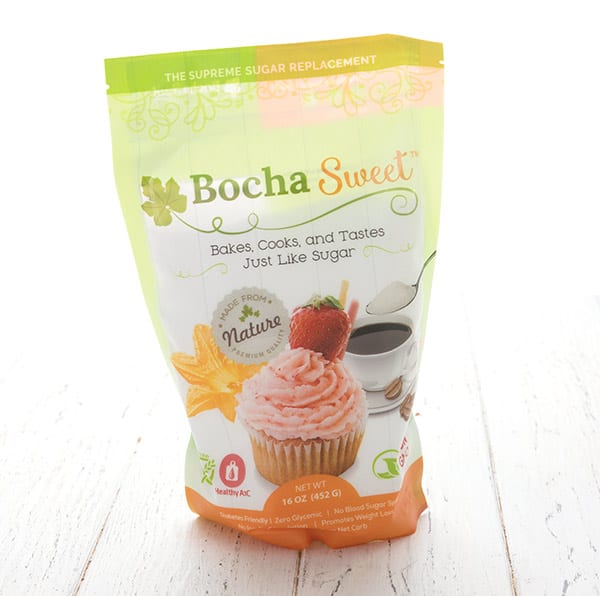
BochaSweet
What is it?
BochaSweet is the brand name of a unique sweetener derived from the kabocha squash, a type of winter squash also know as Japanese pumpkin.
Like erythritol, it seems to have little to no impact on most people’s blood sugar. But like xylitol, it can cause some gastrointestinal upset when consumed in large quantities.
In many ways, BochaSweet functions a lot like xylitol (they are both pentose sweeteners), but it does not appear to be toxic to household pets.
How does it work?
Similar to sugar:
– BochaSweet is as sweet as sugar and so can be used as a cup-for-cup replacement, without an apparent aftertaste.
– It is more hygroscopic and doesn’t re-crystallize so it’s great in sauces, custards, and ice creams. (I have started using it in combination with Swerve in all of my keto ice cream… they stay scoopable even straight from the freezer!).
Differs from sugar:
– Just like xylitol, BochaSweet will not crisp up or brown very well. Cookies end up soft and cakey, and meringues are so gooey that they won’t come off the paper.
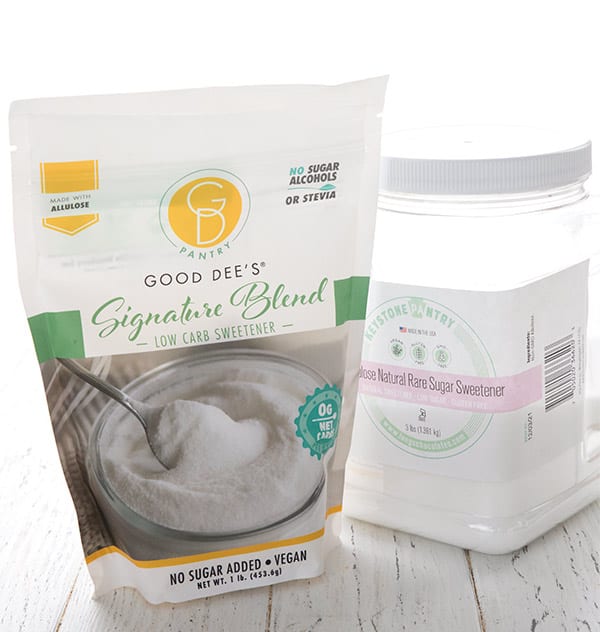
Allulose
What is it?
Allulose is a relative newcomer on the sugar alternative scene and has become incredibly popular. It is a monosaccharide, which means it really is a “sugar”, but one that our bodies don’t treat like a sugar or a carb. It is largely excreted without ever affecting blood glucose levels.
However, I caution you from personal experience that large amounts can cause serious GI distress. Many people don’t seem to suffer from this, but some of us do and it’s…not fun.
So it’s worth testing on yourself in small amounts and building up from there.
How does it work?
Similar to sugar:
– Allulose caramelizes nicely and tends to be hygroscopic, keeping sauces and ice creams soft, and baked goods tender.
Differs from sugar:
– Allulose is only 70% as sweet, which means you need more to sweeten your desserts.
– While it caramelizes well, it doesn’t crisp up well and baked goods tend to be soft and cakey. Even just a little allulose, in combination with other sweeteners, can prevent your cookies from becoming crisp.
– It can over-brown the outside of baked goods, especially the parts that are touching the sides of the pan. Cakes can have a dark, almost burnt appearance, although they aren’t over-cooked.
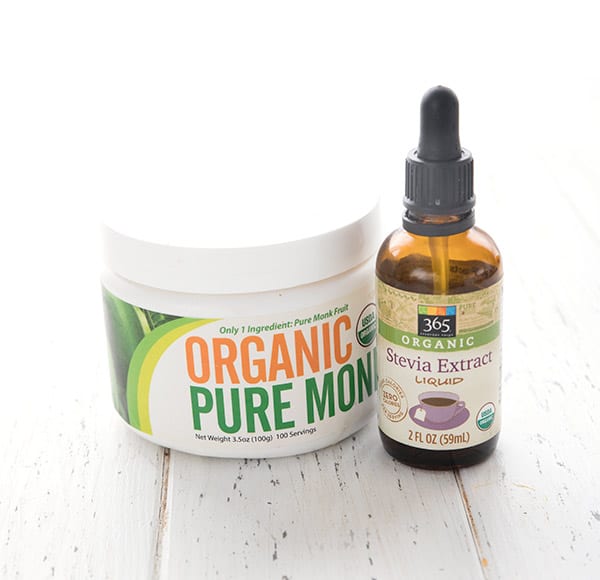
Stevia and Monk Fruit
I am lumping these two together because they have many similar properties and behave much the same way.
What are they?
Both stevia and monkfruit are naturally derived, plant-based sweeteners that are hundreds of times sweeter than sugar. Because they are extremely concentrated, a tiny amount can sweeten a whole recipe.
While that may sound like a good thing, it can have major implications for your keto baked goods. Read on…
How do they work?
Concentrated sweeteners like these have no “bulk” – they have little in the way of weight or volume so they don’t add much to your recipe other than sweetness. They can’t contribute anything to texture or consistency, and they don’t caramelize, crisp, or brown your baked goods.
Bulk is an important factor in anything from cupcakes to frosting. Substituting a non-bulk sweetener means your keto treats may not rise properly, may be more fragile, and may not set properly.
“Monk fruit sweetener”
Please be aware that many brands that bill themselves as “monk fruit sweetener” are actually mostly erythritol. The main ingredient is erythritol, with a little monk fruit to make it sweeter. This means that the sweetener will behave mostly like erythritol.
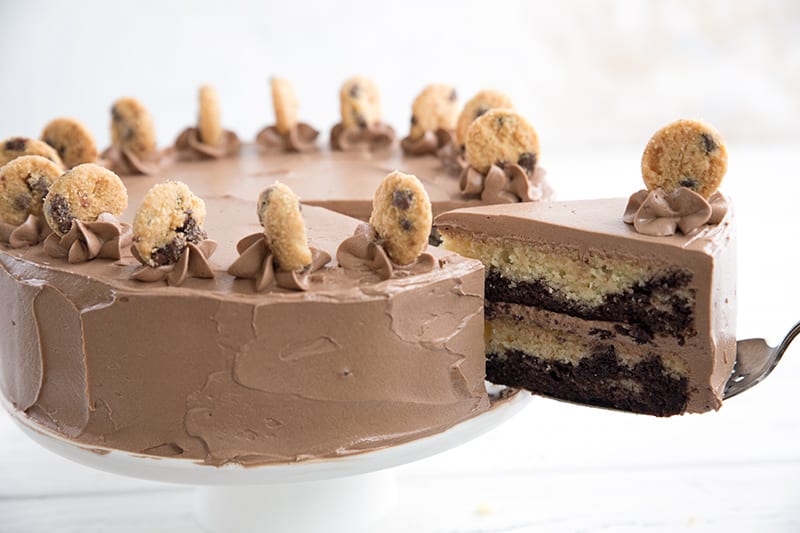
How to use sugar substitutes
I’ve thrown a ton of information at you and I know it’s hard to digest it all. I do this for a living and still I have times when a certain sweetener doesn’t behave the way I think it should. But here’s a quick cheat sheet on what to use when:
Want crisp keto cookies? Use erythritol based sweeteners like Swerve, Lakanto, or So Nourished. Other options will make your cookies soft and cakey. I highly recommend Swerve Brown for the best brown sugar substitute for cookies!
Making a keto cake recipe? Use any sweetener that has bulk (erythritol, BochaSweet, xylitol or allulose), but do be forewarned that some are not quite as sweet as sugar and you may need more of them.
Making a keto frosting? You need a bulk powdered sweetener to give your frosting structure. Erythritol, xylitol, and BochaSweet all have confectioners (powdered) versions. Allulose may as well but I am unsure of brands.
Want a gooey consistency? Try using BochaSweet or allulose, or combine it with another erythritol based sweetener. This combo is perfect for things like keto caramel sauce or my keto pecan pie.
Want keto ice cream that stays scoopable for days? My recommendation is half Swerve and half BochaSweet or allulose. Using only erythritol based sweeteners makes your ice cream rock hard, and all BochaSweet makes it too soft (it stays like soft serve!).
Just trying to sweeten your coffee? Use whatever you like best. They all work well if you don’t need a certain consistency so this is a matter of personal preference.
Still have questions?
Leave a comment and I will do my best to answer!
Adding to the confusion is that many brands on the market are blends of the keto sweeteners I outlined above. Blending sugar substitutes can maximize their sweetness and reduce potential aftertastes.
But I’ve tried such a wide array of sweeteners, I have a good idea of how most of them work. I can also take an educated guess based on the ingredients list. So drop me a line and I will give you all the information I can.

Free Bonus: Secrets to Keto Baking!
Sign up for your favorite recipes delivered straight to your inbox plus get our FREE bonus: Secrets to Keto Baking!

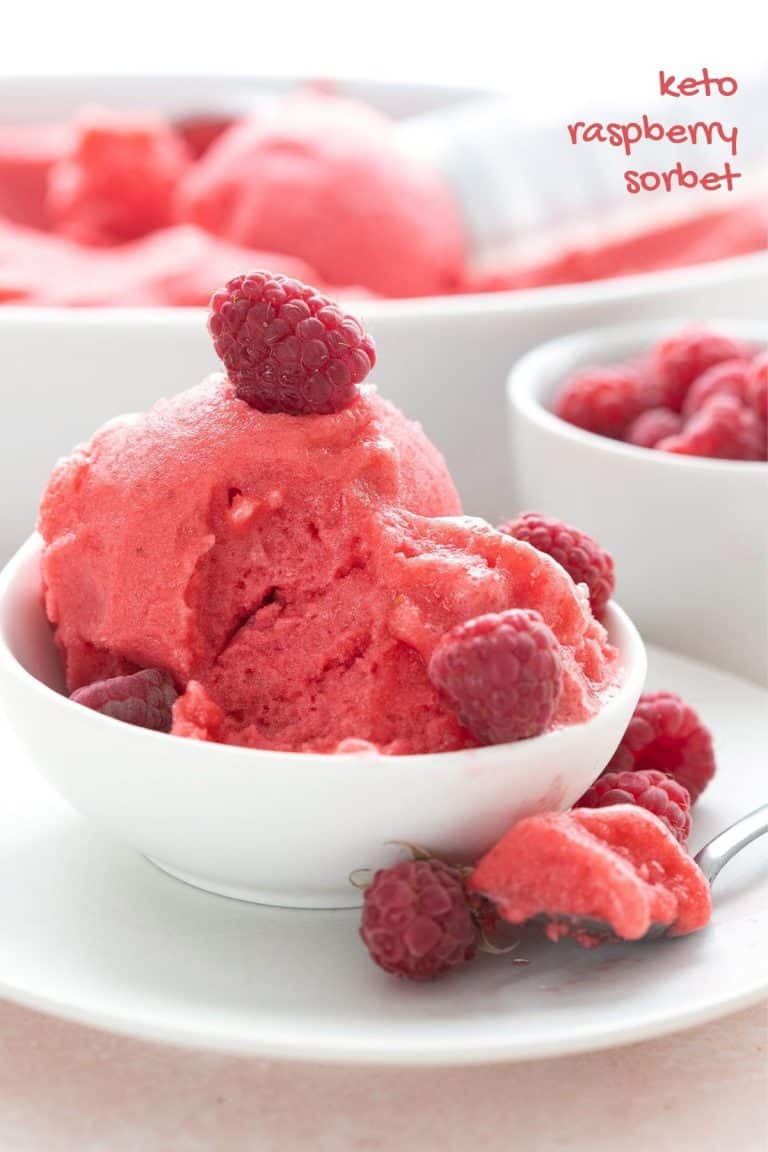



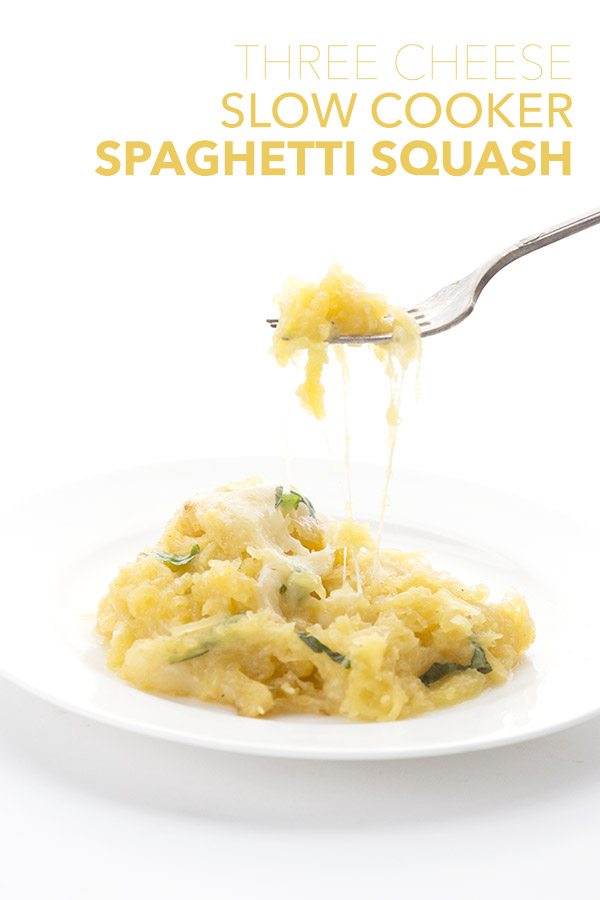









Thank you so much for this needed lesson. I recently made your strawberry ice cream and even my husband (who isn’t doing Keto) loved it. I then made an ice cream from someone else’s site and while flavorful, it is rock hard. I’m going to look at what was used for sweetening and see if I can tweak it.
I have about two cups of actual, frozen lemon flesh. Not the zest and not the peel, just the actual, interior frozen flesh. I would like to make some sort of sorbet or ice cream
from it. What would you suggest for the amount of sweetener? I know allulose but what would the ratio to erythritol be to keep it scoopable? Should I add cream and eggs?
I have a sorbet recipe (raspberry) that uses all allulose to stay soft. Maybe you can use that as I guide. https://alldayidreamaboutfood.com/sugar-free-keto-raspberry-sorbet/
I am curious as to whether you have ever used Stevia in the Raw for baked goods. Unfortunately, I cannot tolerate erythritol as it upsets my digestive system. According to their packaging it measures the same as sugar. Any thoughts or words of advice when baking with this?
Thank you so much!
Thank you – this is a huge help!
Hello,
My son is a Type 1 Diabetic and after some recent studies (valid or not) I’d like to move away from Erythitol as its currently in just about everything he eats.
I’ve tried Allulose in some waffles he likes and it seems OK. I’m just wondering, what is your favorite brand of Allulose. We’ve tried Madhava without issue, but it seems to be in short supply or really expensive (I guess they all are).
Any pointers to other brands I might try would be greatly appreciated!!
The new Swerve Allulose is very good. https://amzn.to/3PGmQNF
To save on money, I just purchase this one because it’s a big 4lb bag. I haven’t tried it as yet! https://amzn.to/44wumit
One added tip… you can combine the erythritol sweeteners and allulose sweeteners in many recipes to help cut costs AND cut back on erythritol 🙂
Thank you Carolyn! I will definitely check those out!!
Hello. I love your website! I have a question about the sweeteners. Back in February of this year a report came out saying that erythritol was dangerous to our health causing blood clotting and cardiac issues. This upset me greatly because I love erythritol. Are you still using it in your cooking? Thanks for all your wonderful work.
Hi. Please read what I wrote about it here: https://www.facebook.com/AllDayIDreamAboutFood/posts/pfbid0xt5znqVhn2KgFZKGTRtMF2CkoeDz5pps28QSWW2r8jqWDAzyKZb3SALbLCiVR4ELl
Thank you so much for your wonderful recipes. I have made several and they are delicious! I have noticed that some of your recipes allow for replacing Bocha Sweet with allulose. Can allulose always be substituted when a recipe calls for Bocha Sweet or only in those indicated? Thank you!
Not always, no. Please make sure you are reading the blog post as I always talk about why I use a particular sweetener.
Where do you find 100% Monkfruit? Everything I have seen has Erythritol in it. Recently I’ve even seen brands that say Erythritol and the fine print says “mixed with “sugar”, really? that’s just too sneaky!
Love, love, love your recipes. I have all your cookbooks and have tried about 90% of your recipes! We started Keto before Covid and my husband and I each lost 50 pounds! It was so easy!
Try searching “pure monk fruit extract”.
Hi Carolyn!
I have 3 of your cookbooks and love them! I’m concerned about using recipes with erythritol after the news about it possibly causing clots and thus cardiovascular events. ( Unfortunately, I have crazy digestive issues with Allulose and Bocha Sweet although I prefer their flavor.) Have you addressed this since so many of my favorite recipes are sweetened with erythritol? Thanks for any insight or info you would be willing to share.
Terri
I have addressed it in a number of places, including Facebook, YouTube, and my newsletter list. I am trying to offer people more options in recipes but I can’t go back and change my thousands of recipes at this time. 🙂 If you have a specific recipe that you want advice on, I can try.
Thank you so much for this information . I wondered why some recipes turned out amazing and others too dry, too moist or grainy!! Now I know why.
I will be in Europe for most of the summer and Allulose is not available there (at least not on Amazon). My main use of Allulose is for ice cream. I note your comment about Stevia not having any bulk. Would this matter for ice cream?
I very (very) much appreciate all the hard work you do and the results that you generously share. It would be tough, or near impossible, for us to maintain this approach to eating without your insights and the tasty recipes.
Best,
I hardly ever do any keto baking anymore due to the “cooling” effect of erythritol. I enjoy it in my coffee, but that’s about it. I’ve learned a lot from your posts about keto baking, some work for me, some don’t. Like using pre-shredded mozzarella for dough recipes. I learned that the hard way trying to make the cinnamon roll ups. What a disaster. It’s expensive to try keto recipes to just end up throwing them out.
Anyway, thanks for all you do, I appreciate your time and effort to make this journey as easy as possible for people.
Thank you for this very handy information. I would like to know if liquid and powdered Allulose are interchangeable? If so, what are the comparative ratios? (I have liquid Allulose I bought for a recipe, but forgot which recipe it was for and now have liquid Allulose that I don’t know what to do with 🤔). Thanks for the fabulous recipes!
They aren’t really interchangeable, since liquid adds liquid to a recipe and will likely throw off the wet to dry ratio. If I say “allulose”, I almost always am referring to granular.
which sugar substitute works best in meringue cookies?
The ONLY one that works is erythritol based.
Thank you! Don’t know what we would do without you. I use Sukrin Gold for my brown substitute. I could eat that stuff with a spoon and it tastes just like regular, imo. Thoughts?
Hello,
Wondering if you have any thoughts on using NuNaturals sweetener?
They have multiple kinds of sweeteners so you need to say exactly which one.
can I get the recipe for the sweetener blend you make.
I am not sure who you are asking? I don’t make a sweetener blend.
Would it work for your strawberry icecream recipe to use WHOLE EARTH
Erithritol and Monk Fruit? Thank you in advance for your reply.
Since it’s just erythritol (with a tiny bit of monk fruit), the ice cream will freeze rock solid if you don’t use some allulose or BochaSweet.
Hello Carolyn,
I just want to thank you for all of your hard work with recipes, showing us the difference in the sugars.
You are an inspiration to me.
Dar
I tend to get the cooling effect when using Erythriyol on cookies. Do you have a recommendation for what to combine with it to counteract that effect. I don’t mind chewy cookies. Thanks:)
Try using some allulose to offset that. I’d do half and half, or 2/3 Swerve and 1/3 allulose.